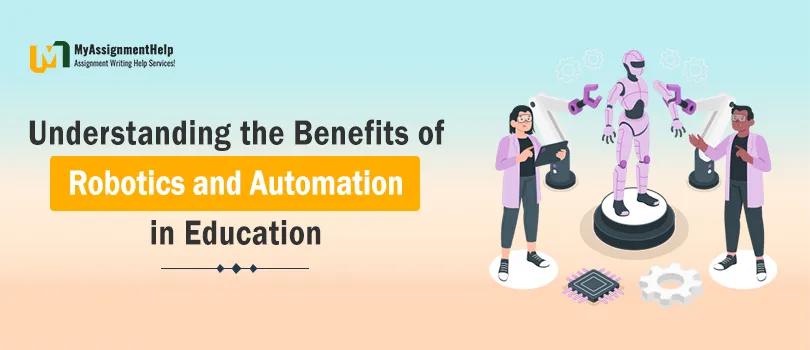In today’s fast-paced world, education is evolving at an unprecedented rate. Traditional teaching methods are being complemented, and in some cases, replaced by modern technological advances. One such advancement is the integration of robotics and automation into the education sector. Robotics and automation assignment help, assignment writing tips, and assignment experts are emerging as crucial tools in facilitating this transition. In this blog post, we will explore the benefits of robotics and automation in education, and how they can enhance the learning experience.

Engagement and Motivation
One of the primary benefits of using robotics and automation in education is increased student engagement. Traditional teaching methods can sometimes fail to captivate students’ attention, leading to disinterest and reduced motivation. However, when students are exposed to interactive robotic technologies, their enthusiasm is often reignited. The hands-on nature of robotics assignments, along with the opportunity to create, program, and control robots, can stimulate students’ interest in the subject matter.
Practical Application of Concepts
Robotics and automation assignments allow students to apply theoretical concepts to real-world scenarios. This hands-on approach enables them to see the practical relevance of what they are learning. Whether it’s coding a robot to perform specific tasks or understanding automation systems, students gain valuable insights into how these technologies work in various industries.
Problem-Solving Skills
When students engage with robotics and automation assignments, they are exposed to challenges that require problem-solving skills. They need to identify issues, analyze data, and find solutions to make their robots or automated systems work efficiently. This fosters critical thinking and creativity, skills that are essential not only in education but also in professional life.
Customized Learning
Robotics and automation can be tailored to individual student needs. With the guidance of assignment experts, teachers can create assignments that suit each student’s skill level and learning pace. This personalized approach ensures that every student can grasp the concepts at their own speed, reducing the chances of falling behind or feeling overwhelmed.
Preparation for the Future
The job market is constantly evolving, with automation playing a significant role in various industries. By incorporating robotics and automation into education, students are better prepared for the job market. They acquire skills that are highly sought after by employers, making them more competitive in the workforce.
Interdisciplinary Learning
Robotics and automation assignments often require students to explore multiple subjects, such as mathematics, engineering, and computer science. This interdisciplinary approach enhances students’ understanding of how different fields of study are interconnected and how they can collaborate to solve complex problems.
Global Collaboration
With the rise of online education, students from around the world can collaborate on robotics and automation assignments. This not only broadens their horizons but also exposes them to different cultures and perspectives. It helps in developing their communication and teamwork skills, which are essential in the modern globalized workplace.
Feedback and Improvement
Robotics and automation assignments can provide instant feedback to students. They can see the immediate results of their programming or problem-solving efforts. This feedback loop allows students to identify their mistakes, learn from them, and make necessary improvements quickly.
Conclusion
Robotics and automation are revolutionizing the education sector by enhancing engagement, motivation, and learning outcomes. With the support of assignment experts, educators can create customized assignments that cater to individual students’ needs, ensuring a more effective learning process. Moreover, these technologies prepare students for the future job market, where automation and robotics play a significant role in various industries. By integrating robotics and automation into education, we are not only preparing students for the future but also empowering them with the skills they need to thrive in a rapidly changing world.





